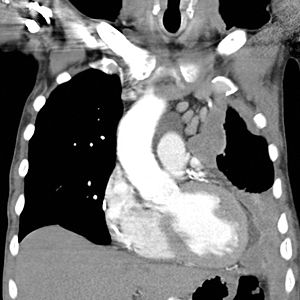Mesothelioma
| Mesothelioma | |
|---|---|
| Synonyms | malignant mesothelioma |
 |
|
| CT scan showing a left sided mesothelioma with an enlarged mediastinal lymph node | |
| Classification and external resources | |
| Specialty | Oncology |
| ICD-10 | C45 |
| ICD-9-CM | 163 |
| ICD-O | M9050/3-9055 |
| OMIM | 156240 |
| DiseasesDB | 8074 |
| MedlinePlus | 000115 |
| eMedicine | med/1457 |
| MeSH | D008654 |
Mesothelioma is a type of cancer that develops from the thin layer of tissue that covers many of the internal organs (known as the mesothelium). The most common area affected is the lining of the lungs and chest wall. Less commonly the lining of the abdomen and rarely the sac surrounding the heart, or the sac surrounding the testis may be affected. Signs and symptoms of mesothelioma may include shortness of breath due to fluid around the lung, a swollen abdomen, chest wall pain, cough, feeling tired, and weight loss. These symptoms typically come on slowly.
Greater than 80% of mesothelioma cases are caused by exposure to asbestos. The greater the exposure the greater the risk. As of 2013 about 125 million people have been exposed to asbestos at work. High rates of disease occur in people who mine asbestos, produce products from asbestos, work with asbestos products, live with asbestos workers, or work in buildings containing asbestos. Often it is around 40 years between exposure and the cancer starting. Washing the clothing of someone who worked with asbestos also increases the risk. Other risk factors include genetics and infection with the simian virus 40. The diagnosis may be suspected based on chest X-ray and CT scan findings, and is confirmed by either examining fluid produced by the cancer or by a tissue biopsy of the cancer.
Prevention centers around reducing exposure to asbestos. Treatment often includes surgery, radiation therapy, and chemotherapy. A procedure known as pleurodesis, which involves using substances such as talc to scar together the pleura, may be used to prevent more fluid from building up around the lungs. Chemotherapy often includes the medications cisplatin and pemetrexed. The percentage of people that survive five years following diagnosis is on average 8% in the United States.
...
Wikipedia
